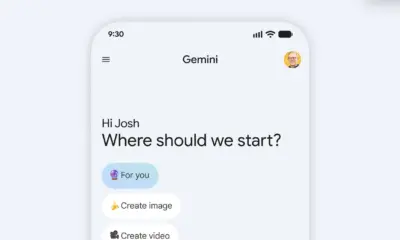Technology
Google’s Willow Chip Achieves Groundbreaking Quantum Milestone

Google has announced a significant advancement in quantum computing with its Willow chip, which has achieved the first verifiable quantum advantage using the Quantum Echoes algorithm. This milestone represents a breakthrough in the field, as Willow executed the algorithm approximately 13,000 times faster than the most effective classical algorithm operating on one of the world’s fastest supercomputers. This achievement marks a pivotal moment in the journey toward practical quantum applications.
The Quantum Echoes algorithm allows the Willow chip to analyze atomic and molecular interactions through nuclear magnetic resonance techniques. This capability extends beyond previous claims of quantum advantage that relied solely on benchmark data. In a recent statement, Google CEO Sundar Pichai emphasized that this outcome signifies a verified milestone toward real-world quantum applications. He highlighted that the breakthrough not only underscores Google’s commitment to advancing quantum research but also its intention to integrate quantum technology with broader artificial intelligence initiatives aimed at addressing scientific and industrial challenges.
Understanding Verifiable Quantum Advantage
Verifiable quantum advantage refers to the ability to independently confirm the outputs of a quantum algorithm. This can be achieved either through other quantum systems or by comparing results with established physical experiments. Unlike earlier models, which depended heavily on statistical sampling, Google’s Quantum Echoes algorithm produces results that consistently align with quantum theoretical expectations. Willow itself is a superconducting qubit processor, featuring around 100,000 physical qubits. Its error-correction design and architecture enhance its scalability compared to previous quantum processors.
This achievement holds significant implications for various fields, particularly in materials science, molecular modeling, and quantum chemistry. By demonstrating the chip’s ability to perform verifiable, domain-relevant tasks, Google has shifted the focus of quantum research towards practical applications, moving beyond theoretical speed-ups.
Industry Implications and Future Directions
The successful demonstration of Willow’s capabilities brings quantum hardware one step closer to practical use. Historically, quantum chips have showcased either theoretical performance or narrow benchmarks, but this milestone opens new avenues for applications in drug discovery, innovative materials development, and simulating quantum systems that classical computers struggle to model.
Despite this progress, experts caution that the achievement does not imply that universal quantum computers will become available immediately. Significant advancements in qubit count, error-correction techniques, and logical-qubit performance are still necessary before quantum systems can manage broad, commercially viable workloads.
Industry analysts suggest that this breakthrough strengthens Alphabet’s long-term position in quantum artificial intelligence. The company continues to integrate research from its DeepMind division with its hardware teams, aiming to produce more reliable quantum systems. As investment in quantum computing expands globally, Google’s proven results have the potential to establish new performance benchmarks for other technology companies.
In summary, Google’s announcement regarding the Willow chip’s performance on the Quantum Echoes algorithm signifies a major advancement in quantum computing. This development not only offers substantial speed improvements over classical methods but also generates results that can be independently verified. While widespread practical deployment remains a future prospect, this milestone enhances the case for the relevance of quantum computing in real-world applications, further solidifying Alphabet’s leadership in this evolving technology landscape.
-

 Science1 month ago
Science1 month agoNostradamus’ 2026 Predictions: Star Death and Dark Events Loom
-

 Technology2 months ago
Technology2 months agoOpenAI to Implement Age Verification for ChatGPT by December 2025
-

 Technology7 months ago
Technology7 months agoDiscover the Top 10 Calorie Counting Apps of 2025
-

 Health5 months ago
Health5 months agoBella Hadid Shares Health Update After Treatment for Lyme Disease
-

 Health5 months ago
Health5 months agoAnalysts Project Stronger Growth for Apple’s iPhone 17 Lineup
-

 Technology5 months ago
Technology5 months agoElectric Moto Influencer Surronster Arrested in Tijuana
-

 Education5 months ago
Education5 months agoHarvard Secures Court Victory Over Federal Funding Cuts
-

 Health5 months ago
Health5 months agoErin Bates Shares Recovery Update Following Sepsis Complications
-

 Technology7 months ago
Technology7 months agoMeta Initiates $60B AI Data Center Expansion, Starting in Ohio
-

 Technology6 months ago
Technology6 months agoDiscover How to Reverse Image Search Using ChatGPT Effortlessly
-

 Science4 months ago
Science4 months agoStarship V3 Set for 2026 Launch After Successful Final Test of Version 2
-

 Technology7 months ago
Technology7 months agoRecovering a Suspended TikTok Account: A Step-by-Step Guide





















